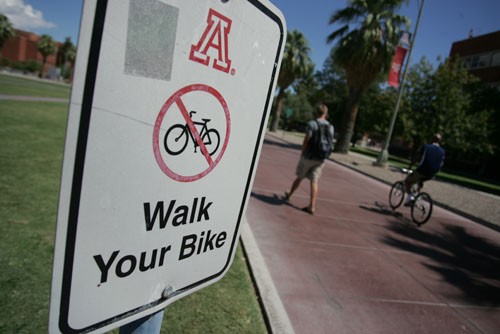Campus police intend to crack down on cyclists who don’t obey traffic rules to make the UA campus safer for cyclists and pedestrians alike.
Campus officials say many cyclists are not aware that they are required to follow the same traffic laws as automobiles, which has lead to an increase in bicycle-related traffic accidents reported this year.
From Jan. 1 to Dec. 31, 2008, five bicycle-related accidents were reported, according to University of Arizona Police Department documents. Already this year, that number has doubled, and UAPD officials added that many bicycle accidents go unreported.
UAPD officer Kelsey Kubik said the main issue behind those large numbers is that cyclists on campus tend to ignore traffic laws.
“”(Cyclists) think that just because they aren’t in a motor vehicle, they don’t have to obey all the signs and traffic lights,”” Kubik said.
Bethany Wilson, a UAPD crime prevention official, attributed the problem to the huge number of bicycles on campus, which she estimated to be between 10,000 and 11,000 on a normal day.
Wilson said she has received dozens of phone calls from concerned students and community members saying that cyclists on campus are not following the “”rules of the road.”” She added that UAPD has programs in the works to both educate the cycling public on traffic laws and crack down on violators.
On Sept. 23, UAPD plans to begin a four-day bike safety campaign in partnership with Parking and Transportation Services.
“”We are going to really start enforcing the law,”” Wilson said. She added that starting soon, cyclists who violate traffic laws can expect to see heavier fines.
“”If you’re not following the rules you’re going to be a danger to yourself and others,”” she said.
UAPD officers are not the only ones frustrated by the increasingly dangerous bike situation on campus. Strolling students are on the front lines of the issue.
Adam Scott Bellos, a Judaic studies senior who frequently walks around campus, said, “”I respect the bikers, but if you are walking and not paying attention, I could see how an accident could easily happen.””
Karin Finkelstein, a communications and business junior, said she rides her bike to school every day. She finds it to be an efficient mode of transportation and enjoys the exercise.
Finkelstein said that on Park Avenue, she does not feel safe because there is not as much room to cycle and she is forced to get close to cars, but on Mountain Avenue there is more room, which makes her feel safer.
She said that she stops at stop signs and follows the traffic laws, but knows people who do not. Finkelstein has never had an accident, but she said she feels the UA campus is not very bike friendly.
“”It’s hard to maneuver at times,”” she said. “”The streets are not paved so well either.”” Finkelstein added that there are not enough bike lanes on campus.
However, Finkelstein is among those who say they feel safer after the opening of a new bicycle path through the Olive Road underpass.
“”I use (the new path) a lot,”” she said, “”and I think the Eller students appreciate the easy access.””









